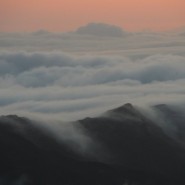
But the chief pride of Maui is her dead volcano of Haleakala–which means, translated, “the house of the sun.” We climbed a thousand feet up the side of this isolated colossus one afternoon; then camped, and next day climbed the remaining nine thousand feet, and anchored on the summit, where we built a fire and froze and roasted by turns, all night. With the first pallor of dawn we got up and saw things that were new to us. Mounted on a commanding pinnacle, we watched Nature work her silent wonders. The sea was spread abroad on every hand, its tumbled surface seeming only wrinkled and dimpled in the distance. A broad valley below appeared like an ample checker-board, its velvety green sugar plantations alternating with dun squares of barrenness and groves of trees diminished to mossy tufts. Beyond the valley were mountains picturesquely grouped together; but bear in mind, we fancied that we were looking up at these things–not down. We seemed to sit in the bottom of a symmetrical bowl ten thousand feet deep, with the valley and the skirting sea lifted away into the sky above us! It was curious; and not only curious, but aggravating; for it was having our trouble all for nothing, to climb ten thousand feet toward heaven and then have to look up at our scenery. However, we had to be content with it and make the best of it; for, all we could do we could not coax our landscape down out of the clouds. Formerly, when I had read an article in which Poe treated of this singular fraud perpetrated upon the eye by isolated great altitudes, I had looked upon the matter as an invention of his own fancy.
I have spoken of the outside view–but we had an inside one, too. That was the yawning dead crater, into which we now and then tumbled rocks, half as large as a barrel, from our perch, and saw them go careering down the almost perpendicular sides, bounding three hundred feet at a jump; kicking up cast-clouds wherever they struck; diminishing to our view as they sped farther into distance; growing invisible, finally, and only betraying their course by faint little puffs of dust; and coming to a halt at last in the bottom of the abyss, two thousand five hundred feet down from where they started! It was magnificent sport. We wore ourselves out at it.
The crater of Vesuvius, as I have before remarked, is a modest pit about a thousand feet deep and three thousand in circumference; that of Kilauea is somewhat deeper, and ten miles in circumference. But what are either of them compared to the vacant stomach of Haleakala? I will not offer any figures of my own, but give official ones–those of Commander Wilkes, U.S.N., who surveyed it and testifies that it is twenty-seven miles in circumference! If it had a level bottom it would make a fine site for a city like London. It must have afforded a spectacle worth contemplating in the old days when its furnaces gave full rein to their anger.
Presently vagrant white clouds came drifting along, high over the sea and the valley; then they came in couples and groups; then in imposing squadrons; gradually joining their forces, they banked themselves solidly together, a thousand feet under us, and totally shut out land and ocean– not a vestige of anything was left in view but just a little of the rim of the crater, circling away from the pinnacle whereon we sat (for a ghostly procession of wanderers from the filmy hosts without had drifted through a chasm in the crater wall and filed round and round, and gathered and sunk and blended together till the abyss was stored to the brim with a fleecy fog). Thus banked, motion ceased, and silence reigned. Clear to the horizon, league on league, the snowy floor stretched without a break–not level, but in rounded folds, with shallow creases between, and with here and there stately piles of vapory architecture lifting themselves aloft out of the common plain–some near at hand, some in the middle distances, and others relieving the monotony of the remote solitudes. There was little conversation, for the impressive scene overawed speech. I felt like the Last Man, neglected of the judgment, and left pinnacled in mid-heaven, a forgotten relic of a vanished world.
While the hush yet brooded, the messengers of the coming resurrection appeared in the East. A growing warmth suffused the horizon, and soon the sun emerged and looked out over the cloud-waste, flinging bars of ruddy light across it, staining its folds and billow-caps with blushes, purpling the shaded troughs between, and glorifying the massy vapor- palaces and cathedrals with a wasteful splendor of all blendings and combinations of rich coloring.
It was the sublimest spectacle I ever witnessed, and I think the memory of it will remain with me always
– Mark Twain
Recent Comments